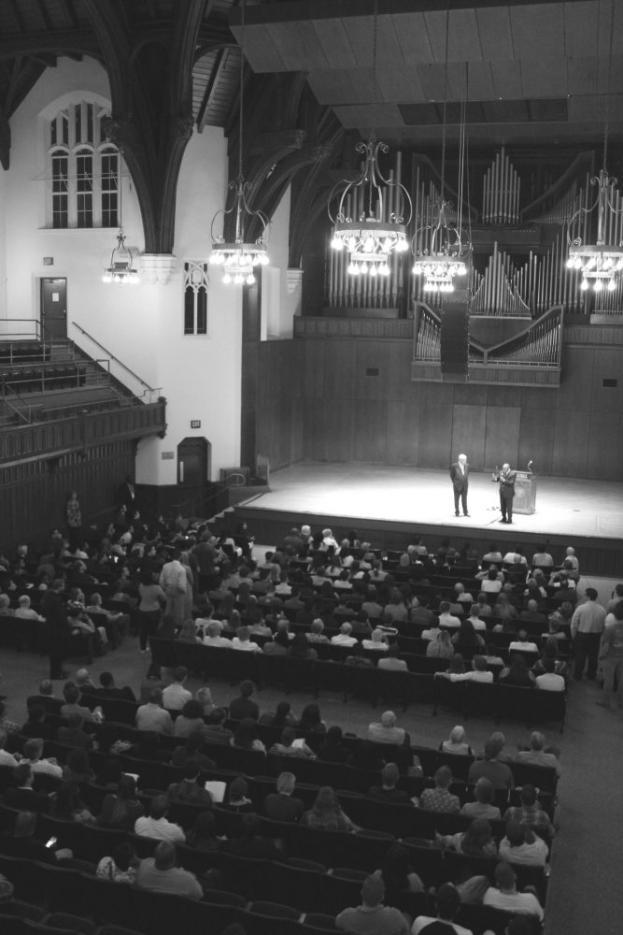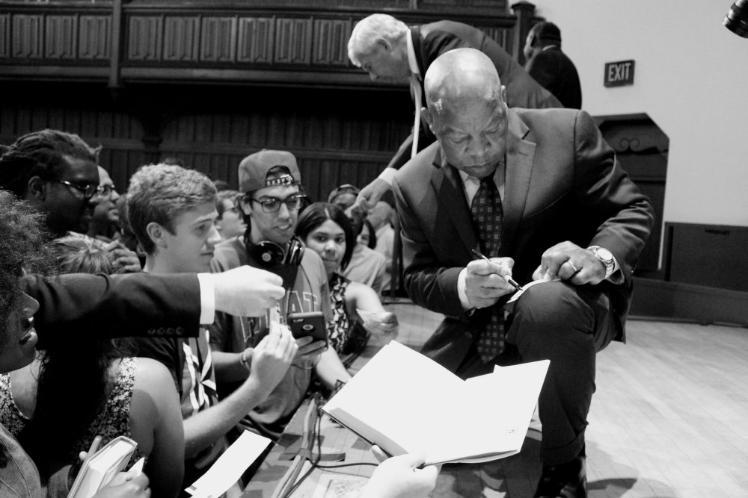Civil Rights icon captivates audience at public address

As the last surviving “Big Six” leader of the Civil Rights Movement makes the rounds of Capitol Hill, he sees young people who remind him of what America looks like: black, white, Asian-American, Native American.
It’s an encouraging sight for U.S. Rep. John Lewis, who delivered a powerful speech focused on the power of unity and perseverance Oct. 16 at University Auditorium.
The voting rights activist’s appearance, sponsored by the College of Journalism and Communications, the Bob Graham Center, the Department of Political Science, the Samuel L. Proctor Oral History Program, the African American Studies Program, and the College of Liberal Arts and Sciences marked the 50th anniversary of the Voting Rights Act.
“We need to get people to be just a little more open,” Lewis told a crowd of about 400. “Build a sense that we are one family and we are all one people.”
Speaking from a sparse stage that held nothing more than a lectern, Lewis’s robust presence commanded attention as he reflected on his days growing up on a farm in Pike County, Alabama, and his fondness for raising chickens. What appeared at first to be a rambling tale culminated in a pointed jab at his Washington colleagues.
“My chickens listened to me better than some members of the Congress, and they were more productive,” Lewis quipped. “At least they laid eggs.”
Lewis spoke eloquently of the events leading to first meeting with Martin Luther King Jr. and his involvement with the Civil Rights Movement, which began when he was a college freshman.

“My folks told me not to get into trouble,” Lewis said. “My mother thought I was crazy. She thought I lost my mind.”
Risky moves and bold actions marked most of Lewis’ young life. He was arrested 45 times during his years as a Freedom Rider and a member of the Student Nonviolent Coordinating Committee, for which he organized the voter registration efforts that led to the pivotal Selma to Montgomery marches.
Singling out a pivotal moment, Lewis recalled March, 7, 1965, when he was attacked along with hundreds of voting rights activists who were attempting to cross the Edmund Pettus Bridge in Selma, Ala. Lewis suffered a concussion after a state trooper hit him with a nightstick.
“Sometimes we have to stop watching, get off our knees and get on our feet,” Lewis said, entreating the audience to not be afraid, “to mobilize, mobilize, mobilize.”
Responding to a question from second-year political science major Oliver Telusma, who wanted Lewis’ opinion on the Black Lives Matter movement, the 75-year-old praised the effort for expanding beyond the limited scope of what Americans consider to be activism.

Sara Clifton, a member of a community organization called Bridges Bettering Race Relations, traveled from Ocala to hear Lewis. Clifton, 57, called the evening a dream come true.
“John Lewis never wavered,” she said. “He never lost his character or his devotion to non-violence.”
Lewis left the stage with words of encouragement that reflect his still-rebellious spirit.
“Get in the way,” he said. “Get into trouble – good trouble, necessary trouble that inspires people.”